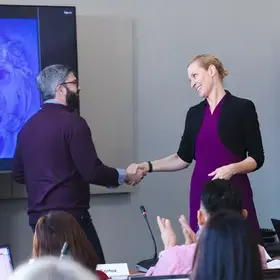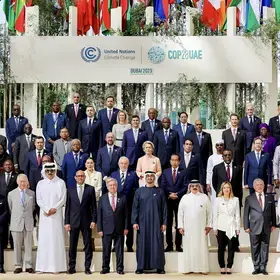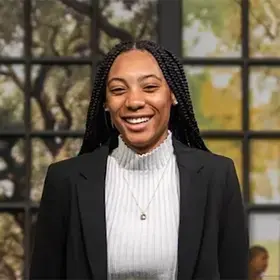By Aminah Taariq-Sidibe, ’23SPS, Strategic Communication
When I started my undergraduate career in environmental science at Cornell University, I began to realize that climate change was not only an ecological crisis but also a crisis of communication. That’s what led me to the Strategic Communication program; its interdisciplinary nature allows me to tailor my experience to maximize my educational and career goals.
Since I enrolled, I’ve met many people who specialize in the emerging field of sustainability communications, including Trisha Bauman, an alumna of the Executive M.S. in Strategic Communication program, principal and founder of her own consultancy, TJBauman LLC, and president of the governing board at the International Society of Sustainability Professionals (ISSP). “I have an amazing network from my experience as a student and from serving as a Capstone Project advisor in the Executive M.S. in Strategic Communication program. Having trusted colleagues across industries and markets is a great resource,” she shared in a recent interview with me. Bauman's consultancy offers services in sustainability strategy and communications.
Among other things, we spoke about the work she is doing, her application of systems thinking, and her approach to strategic communication.
What kinds of projects are you currently working on in your firm?
We are primarily working with early-stage ventures, regenerative development initiatives, impact finance firms (both funding pitches and stakeholder relations), and a new creative leadership initiative for a regional government.
How does strategic communication play a role in your work?
Climate solutions and sustainability are inherently systemic; they have to be enacted across diverse stakeholders and sectors. Cultivating a shared purpose across diverse sectors and interests requires strategic communication—research and insights, market analysis, stakeholder engagement, collaborative ideation, strategic messaging, and campaign planning. These methodologies enable a successful sustainability initiative and enable it to scale.
How do you communicate a problem to somebody unaware of or unaffected by it?
I think it’s always about bringing the issue to a place of implicit relevance to the person(s) in front of you. It is necessary to find out where and in what ways there might be shared interest in order to find a common purpose and align on goals. This approach is essential to the success of any sustainability initiative involving collaboration across sectors, functions, and stakeholders.
What are some effective or cool digital communication strategies or initiatives you’ve seen recently?
A few recommendations:
- There’s an initiative called Project Drawdown, which is an incredible online resource for climate solutions and storytelling that can inform strategic communication and also just skill and knowledge development.
- Global Footprint Network, which is led by Mathis Wackernagel, a Hall of Fame Honoree of the International Society of Sustainability Professionals (ISSP).
- Volans Ventures—based in the U.K. and founded by another ISSP Sustainability Hall of Fame Honoree, John Elkington—has great resources and is doing fascinating work at the forefront of change across industries, businesses, and regional governments for sustainability and regenerative development. They have an online forum called the Green Swans Book Club that meets monthly to dive into books on regenerative development and to hear from thought leaders.
- In early 2023, ISSP will release a new learning platform and global community of practice that will be a great resource, allowing for topic-specific investigation, learning, and community building around different industries, functional expertise, and geographic regions, within the spectrum of sustainability activity going on across sectors and around the world.
How about non-digital communication initiatives?
There are many new and growing conferences focusing on both climate change and sustainability that address the intersection of business, NGOs, and policy. They provide great learning and networking opportunities. I recently led a panel discussing ESG ratings at the annual Reuters Sustainability Reporting and Communication Conference in New York City. In April 2023, I’ll present at Reuters’ Responsible Business USA summit, which focuses on business and sustainability across sustainability issues, including social justice, environmental impacts, and decarbonization. Finally, Climate Week NYC is an incredible experience, packed with programming and events in real life and mixed media, drawing thought leaders from around the world. Columbia Climate School was the university partner for the conference in September 2022.
About the M.S. in Strategic Communication Program
The business world’s around-the-clock communications challenges are demanding a new level of strategic thinking. Columbia University’s Master of Science in Strategic Communication graduates emerge equipped with all the essential skills and tools for a successful career in a wide range of communication fields. The program is available in three formats for professionals of varying experience levels and locations: the Executive M.S. for experienced (6+ years) communication leaders (36 credits in 16 months for degree completion); Full-Time M.S. for early-career communication professionals and career-changers (36 credits in 12 to 16 months for degree completion); and Part-Time M.S. for working professionals looking for flexibility (36 credits in 24 months to three years for degree completion).
Application deadlines for fall 2023 enrollment are quickly approaching. Visit the admissions deadlines pages for your chosen format for dates: Executive M.S.; Full-Time M.S.; and Part-Time M.S.



